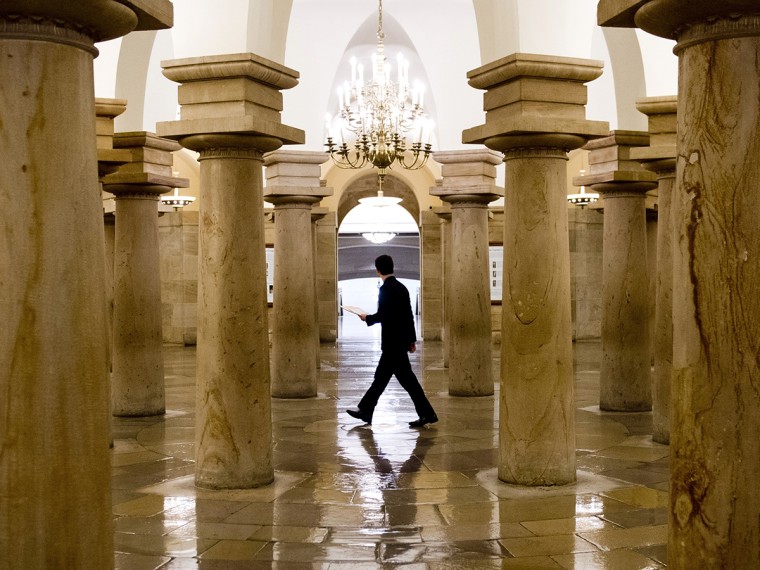The old adage—turn off the lights to save some money—just doesn’t work when it comes to the government.
In fact, shuttering government offices has actually cost taxpayers money—an estimated $2 billion in today’s dollars the last time it happened in 1995 and 1996, when the government closed for 27 days.
And this time would be no different, budget experts say. Even if workers aren’t given backpay, as they were in the nineties, the government will still lose out on important sources of revenue, like inspection fines and visa and licensing fees. Plus, there are back costs to re-opening.
So while Republicans continue to dig in the ongoing budget showdown, they could end up doing the very thing they say they’re in Washington to stop: new government bills.
"It doesn't save any money at all," says Stan Collender, a former Congressional budget aide. "You might not pay the employees like we did that last time—you may save on some salaries—but you're going to incur additional costs."
How did that happen? During the 1995-1996 shutdown—actually two government closures that lasted a total of 27 days— government workers who were furloughed ultimately received backpay for the days that weren't allowed to come to work. That was the biggest cost of the shutdown, totaling about $1 billion, according to the Office of Management and Budget.
At least 800,000 federal workers are expected to be furloughed if the government shuts down this week. The Pentagon alone is expected to furlough 400,000 civilian workers, according to a Defense official, who added that a shutdown would delay death benefits to the families of military who die on active duty.
The government would also lose money from revenue, fees, and fines. The Environmental Protection Agency, for example, estimated that $63 million in environmental inspection fines weren't collected in 1995-96. About 200,000 passport applications went unprocessed, as did 20,000-30,000 visa applications from foreigners every day, which meant lost application fees. Over 1,000 export licenses and their accompanying fees were also delayed, according to OMB.
In total, the OMB estimated that the 1995-96 shutdown cost a total of $1.4 billion, or about $2 billion in today's dollars. Some of the lost revenue in fees and fines would eventually be recouped.
But the price tag also doesn't include the indirect costs of a government shutdown. If the government shuts down on Tuesday, all 401 national parks, monuments, battlefields, and other park units would be closed. In 1995-96, the closure of those parks cost businesses and local governments $295 million by preventing 7 million park visits, as political scientist Roy Meyers points out.
Even more money could be lost every day this time around. "According to the Department of the Interior, the last government shutdown in 1995-1996 cost local businesses $14 million per day. Our analysis indicates the actual impact on businesses now could be closer to $30 million per day," the National Parks Conservation Association said.
More federal workers could end up being furloughed as well: In 1995, Congress had already passed a defense appropriations bill, funding both military servicemembers
Even before a shutdown happens, the government becomes less productive: "You've got the lost efficiency of projects that are going to stop in their tracks," says Collender. Agencies lose time by having to make contingency plans; unpredictable budgets make government spending less efficient; and private contractors lose out on bidding opportunities.
"The possibility of a shutdown has left contractors wondering how or even if they can continue to perform their federal contracts," the Associated General Contractors of America said on Thursday. And a shutdown would be a double whammy for both government workers and private contractors already hit by the across-the-board sequestration cuts that have been in effect since March.
While a brief shutdown wouldn't have much of a noticeable effect on Main Street, a shutdown that lasted for weeks could reduce the country's economic growth this quarter by 1 to 1.5 percentage points, according to Mark Zandi, chief economist of Moody's Analytics.
That said, there are also differences between today and the Clinton era that could affect the ultimate cost of a shutdown. Backpay to federal workers isn't automatically granted. Congress must pass legislation to spend the money, and it's less likely to do so this time around, as legislators have put federal workers' pay and benefits on the front lines of fiscal restraint. That could significantly lower the immediate price tag, as compared to 1995-96.
But while it might save taxpayers money, experts say withholding federal pay wouldn't change the overall cost of a shutdown to the economy. "Irrespective of whether the federal government pays them, the workers will be sitting at home not producing anything when they could be working providing services to the country," said David Kamin, a budget expert and law professor at New York University. "That's a cost to the economy, whether or not the workers get paid."
